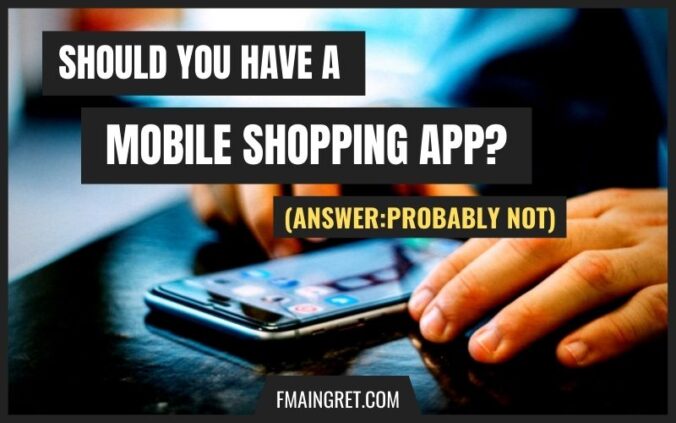“Everyone is glued to their phones these days.” We’ve all heard that dozens of times, yet it is more true than ever. Smartphones are a big part of our lives, and we now have the ability to shop online from anywhere at any time. Technology creates massive business opportunities, and entrepreneurs will always take advantage of it. In the ecommerce space, there are now thousands of mobile shopping apps available for download. As an entrepreneur, you’ll find many people recommending that every online business should have its own app. So, should you jump on the bandwagon, or would creating a mobile app be nothing more than a huge waste of time and money?
Introduction
Almost everyone owns a smartphone nowadays, and people love shopping from their phones. I personally spend way too much time ordering and tracking my orders on my phone. Mobile ecommerce sales reached $359.32 billion in 2021 and are expected to double by 2025. This new way of shopping led many businesses to develop mobile apps to enhance the customers’ experience.
Sephora is one of the leaders in the beauty industry, with over a thousand stores across thirty countries. Their mobile app offers the classic features you expect from a shopping app: easy navigation, integrated loyalty rewards program6*66., etc. It also enhances the in-store experience by allowing customers to scan products and access customer reviews. Finally, Sephora makes it possible to virtually try makeup products via their Sephora Virtual Artist app.
Why you may not need an app for your business
That sounds exciting, right? Maybe you are still wondering whether you, as an ecommerce entrepreneur, should develop a mobile app for your business. A quick Google search will find you many articles telling you that, yes, every online business should have a mobile app! However, I think that is a load of nonsense. Let me tell you why so many people recommend having a mobile app: these articles are often written by people working in the software industry. They aren’t providing you with trustworthy advice; they are selling you their services. It’s like hearing a car salesman tell you that you need a new car.
Let’s look at some of these articles’ key points, and why I think they can be misinterpreted. Sure, these articles make good points and show interesting statistics, but they often hide part of the story.
Reason 1: Mobile shopping continues to grow in popularity.
While this is true, keep in mind that mobile shopping also includes mobile websites. Customers can shop either on an app or a website, and many will choose the latter. Downloading an app takes time, space on their device, requires frequent updates, and can be intrusive with tons of unwanted notifications. That is why most people will only download an app if they really need it, because of certain features, or because they frequently shop with that company.
Reason 2: People prefer shopping on an app rather than a mobile website
You’ll often hear statistics about people preferring shopping on apps. If I quote an article: “78% of consumers would rather use an app to buy from an ecommerce shop than a mobile website. That’s right—78%.” Customers will talk about the faster app, the personalization, and more advanced features. However, I see a problem with this statistic. I can’t say for 100% as I cannot find the details on this survey, but I think they asked those who have both the website and app already available on their device. I believe the results would be widely different if people were asked, “Would you rather shop on an online website, or download, setup, and then use a mobile app?”. Yes, using an app is better, but most people don’t want to download it unless they have a good reason to do so.
Reason 3: Higher conversion rate
I read in several articles that app conversion rates are two to three times higher than on a website. Customers view up to five times more products per visit, and the average order value is twice as high! That sounds too good to be true, but I believe these numbers are accurate. Yet, I think some info is missing in the article. Of course, conversion rates will be much higher; people using apps are the most dedicated shoppers – those who love online shopping and/or really like the company they buy from. Usually, they are already familiar with that company and are much more likely to buy from them. They even trust them enough to install their app on their phone! So, no miracle here; the app is catering to a different type of customer who will spend more than average.
Reason 4: Better communication
The interaction rate with push notifications is much better than with marketing emails. But again, the authors of these articles don’t explain that the app user is much more interested in the brand/company than the average customer. Customers allowed push notifications for a reason and were expecting those when downloading the app. Push notifications might be a better way to reach those customers. But not everyone is willing to download an app that sends intrusive notifications.
Reason 5: Better shopping experience
I agree with this reason, in some cases. While you can do a lot on a mobile website, an app makes it easier to add some more advanced features. I talked about the Sephora app and the ability to virtually try makeup products. This is the type of feature that makes it worthwhile to have an app. The eyewear brand Warby Parker included a similar feature on its app. Customers can virtually try glasses, and the app can even provide personalized recommendations based on the customers’ head shape. However, not every business needs these fancy features; you can already do a lot with a well-designed, mobile-optimized website.
In the end, entrepreneurs should consider the value the app brings to the customers and assess the app development costs. A mobile app can cost dozens or even hundreds of thousands of dollars to develop, not including maintenance and update costs (I worked in IT in the past, and projects almost always end up more expensive than initially expected). For small businesses, cash flow can be tight. Some customers love shopping apps, but many others would rather not download another app on their devices. Is it worth spending so much money on a mobile app while a mobile website can work for almost everyone? Wouldn’t that money be better spent on developing new products, hiring staff, or advertising existing products? I believe mobile shopping apps are the most helpful when they bring significant value to the customer or if the app is part of the company’s value proposition.
Conclusion
Some huge companies, like Amazon or Sephora, developed great mobile shopping apps that people use. But these are the top 1%; they already have a huge customer base. For 99% of smaller businesses, the investment might not be worth it (but a well-designed mobile website is a must). That is why I think these articles, often written by people in the software development industry, can be misleading. They make good points but don’t tell the whole story. Businesses have limited resources and should focus on what matters the most.

